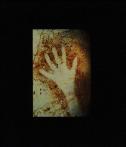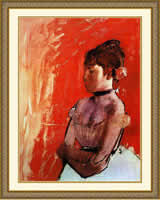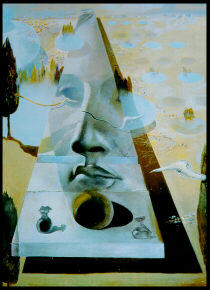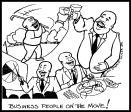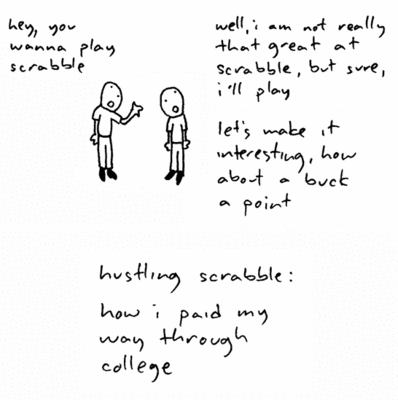
A
post by Veena on a movement to abolish marriage in Sweden prompted a meditation on the incredible lack of imagination that human beings bring to relationships. Think about it - in every other aspect of our life we encourage and actively seek variety, acknowledging that different people have different preferences and needs, which require different service offerings to meet them. Cars, clothes, music, books, insurance policies, television channels - wherever you look you find a wide range of possible choices available to you, so that not only can you easily find one that is exactly suited to your needs / desires, but, in fact, picking one over the other becomes an important way of making a statement about your own personality. And yet when it comes to what is arguably the most important relationship of our adult lives, we're stuck with this cookie-cutter, one-size-fits-all straitjacket of an institution called marriage. Worse, even within that institution, there's so little variation - so that the range of what a 'proper' marriage does and does not include is so heavily proscribed (there are actually laws governing this, for God's sake!).
I mean okay, so I see why in a world before birth control and DNA testing, in a patriarchal society where women were objects, land was a key resource and the civil code was fairly rudimentary, stringently defined monogamous marital relations were the only viable social form. After all, these were not times when individual choices mattered that much anyway - you didn't get 294 brands of everything - so having a system where you were either married or unmarried made sense. But surely now that the world has moved on, and greater differentiation has been made possible, we can afford the luxury of looking beyond a single narrowly defined relationship model?
Of course, you could argue that not everyone gets married and men and women do actually relate to each other in a number of different ways. This is true, I think, but it doesn't obscure the fact that marriage is still the only solution that is immediately socially accessible - the only thing you can get 'off the shelf'. No other form of relationship even begins to approach the levels of legitimacy that marriage enjoys:
1) Most other forms are generally seen (often even by the people in them) as temporary / makeshift solutions. By and large there are all just steps towards or away from the sanctimonious temple of marriage. Tell someone you have a long term girlfriend (or boyfriend) for instance, and people will instantly either assume you'll marry her (or him) at some point, or / and wonder why you haven't already. And joint custody parenting, for instance, is not a stand-alone relationship option - you can only get to it by getting married and then getting divorced / separated.
2) Most forms end up being approximations in one way or another of the marriage paradigm. So live-in relationships, for instance, are just marriage without the contractual complications, or the legal crutches. In particular, I think we are not able to break away from the entirely unnecessary assumptions that greater, more serious affection is a) associated with monogamy and b) directly proportional to the amount of time you spend with someone.
3) Even where people have innovated and improvised new forms of relationships, they have not gained the kind of currency that marriage enjoys. Much of this is to do with language, and with the absence of clear definitions and words to go with them. The problem is that marriage is the only thing we have a blueprint for. We understand how it works - there are ground rules, there is a convenient diagram which tells us where everything goes and how it is all to be put together. It's painting by numbers. To break out and try to paint something by ourselves, making it all up as we go along is an almost impossible task for any couple.
Understand that I'm not saying that marriage should be abolished, or that there's anything wrong with it. I recognise that for many people marriage might be exactly what they want - just as I recognise that there are people who loved the Da Vinci code or whose idea of a perfect evening is one spent watching Desperate Housewives or talking about how George Bush is such a visionary. My argument is precisely that the fact that people's tastes and interests vary so widely suggests that a single relationship form for everyone is not the ideal solution. If I don't enjoy any of the other things that fascinate you, why should it be that I'll enjoy being married just because you do?
Nor am I suggesting for a minute that breaking away from marriage is easy. Clearly there are strong inertial forces at work; certainly there are centuries of social conditioning to deal with. There are obviously advantages to sticking with the status quo - it's the mechanism through which social institutions acquire legitimacy.
Ceteris paribus, the conventional organisation form will always be the best one to choose.
But throughout history, the development of new forms has been engendered by a violent disconnect between the needs of the specific situation and the socially imposed form. I'm not saying that we should do away with marriage on general principle. I'm simply saying that for those of us for whom a married state is manifestly in opposition to our personal emotional needs, there is value in exploring alternate relationship choices, rather than making a dichotomous choice between being 'married' (with everything that entails) and staying single.
Personally, for instance (and this is obviously what this entire post has been building up to), I'd prefer a relationship form that I shall christen a 'sabbathal'. A sabbathal is basically like a marriage on weekends. The general idea is that you have one special life partner, but rather than living together, you have an arrangement where you maintain independent homes and just spend some weekends / weeknights together. This means that you have someone with whom you can share important life events, vacations, crises, intimacy and books; someone you can count on for support and turn to for advice, someone you can love and cherish. At the same time, you don't have to come home to them everyday, you don't have to spend all your time with them or involve them / be involved in everything you do; you don't completely give up your personality, you don't have to have the same friends or the same taste in furniture, you don't have to argue about how you're going to spend your evenings together, if you want the space to be alone you can easily get it, no questions asked. It'd be like having a long-term girlfriend / boyfriend only without the expectation / pressure to move towards something more - that's what the stable long-term state would look like.
Of course, you could just live your life this way anyway - but the point is that it would be a lot easier / nicer if sabbathals were defined and understood to be a legitimate and socially acceptable relationship form. So you wouldn't have to explain to everyone what it was about. So you'd have other couples that had similar arrangements who you could hang out with. So you would have sabbathal counselling sessions for people whose sabbathals were going through a difficult time. So you would have books and movies about couples in happy and unhappy sabbathals. So the New York Times would have articles about the relevance of sabbathals in the modern age, and your local feminist would go around raging about how sabbathals were derogatory to women. Wouldn't that be a wonderful world to live in.
People will argue that sabbathals are not the best arrangement to bring up kids in. Maybe, but a) they may be perfectly good option for people who don't want to have kids anyway and b) it's probably better for a kid to be brought up in a sabbathal than to be brought up in an unhappy marriage or in a single parent household because his parents have divorced or seperated - which is what ends up happening if you force-fit marriage on people who it's not the right model for. And the relevant comparison isn't necessarily with marriage anyway. In the absence of alternate relationship forms, given a strict choice between being married and staying single, people like me would choose to stay single - so the relevant comparison is between bachelorhood and sabbathal, not between marriage and sabbathal.
Understand that I'm not for a moment suggesting that sabbathals are the only alternate form that we could or should develop - I offer the example just as an illustration of what I mean by alternate forms - and because it's the one that I personally would like. There may be people who are perfectly happy, for instance, living with someone else, but who find monogamy an unacceptable condition - such people might have a preferred form that looked very different. My general point is just that there's no reason why society shouldn't create, recognise and make available these forms to people who want them. Let's break away from a mindset that says you can have your relationship in any colour you want, as long as it's marriage.
P.S. For those of you who are thinking this is all just a long-winded and fairly desperate attempt to hook up with someone - you're right, of course. But then, what isn't?




